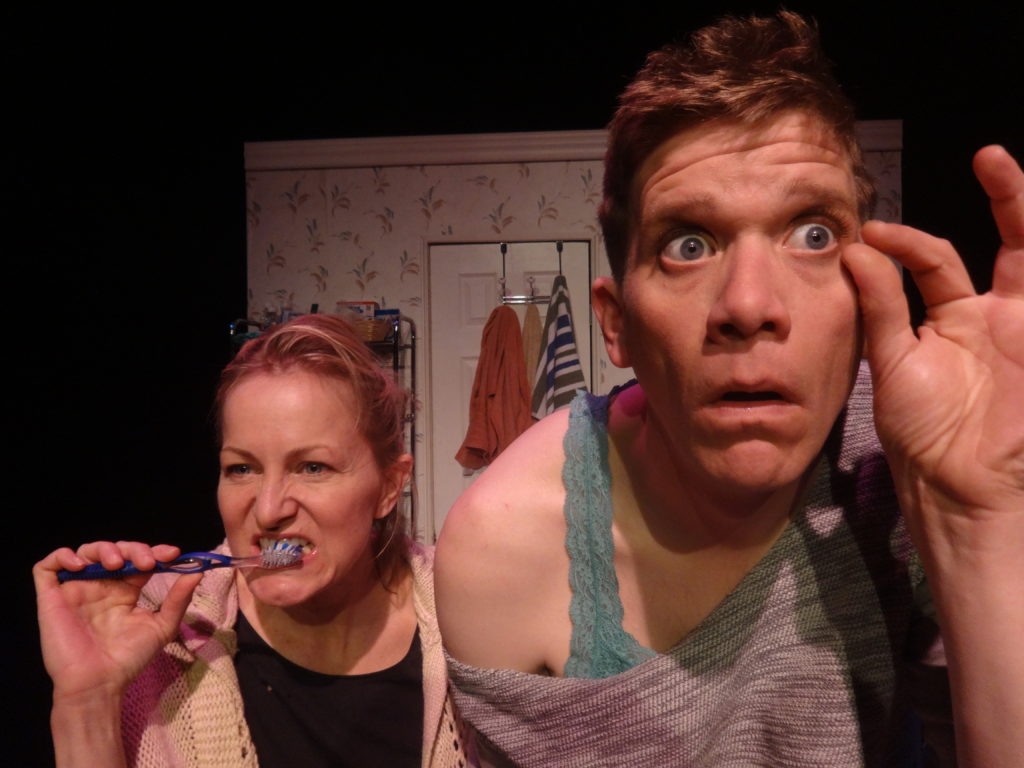Some things to know before attending Buntport Theater Company’s 10 Myths on the Proper Application of Beauty Products:
The play is set in a bathroom ‐ a somewhat cramped, lighted square in the middle of the playing space flanked by semi-darkness in which you can watch the characters not currently on stage standing, sitting, interacting or walking very slowly toward the doorway for their entrances. It’s even more cramped because the three musicians who comprise Teacup Gorilla are ensconced in the bathtub, providing the sound. 10 Myths is experimental but not pretentious, and more interested in enlightening than befuddling you ‐ but you won’t learn anything useful here about shampoo, hair gel or makeup.This production doesn’t make sense ‐ at least not linear sense. The piece is based on the novel Riding SideSaddle, by Miriam Suzanne, who’s also part of a band called Teacup Gorilla. The novel is written on 250 notecards, and it’s “open source” ‐ which means, I think, that you can find and modify it if you want. Buntport, a company known for creating original plays based on all kinds of prompts ‐ seeing Tommy Lee Jones in line for a production of La Bohème in Santa Fe; locating a large sheet of artificial ice and figuring it would work perfectly as an underpinning for Kafka’s Metamorphosis; wondering if Shakespeare’s Titus Andronicus wouldn’t be better as a musical ‐ clearly felt free to do exactly that. So the troupe has added dialogue and a kind of goofily mixed-up structure based on repetition of the beauty-products motif.
So now you’re ready.
The characters are a group of people who live together. They’re all misfits, primarily sexual misfits, and none of them are at home in their bodies. They’ve known each other forever, and they’re open about their bathroom habits ‐ except for the guy who can’t pee when anyone else is there. In the persons of actors Erik Edborg, Brian Colonna, Hannah Duggan and Erin Rollman, they’re warmly accessible. These actors work together with comfort and authority, with an almost musical sense of timing that comes from years of creating theater as a team. Two new actors, Diana Dresser and Michael Morgan, have joined them here, and ‐ surprise ‐ they fit in brilliantly and add some wonderful madness of their own.
At the center of the story (non-story?) are Herman (Edborg) and Sam (Dresser), aka Hermaphrodite and Salmacis. They are striving to become one being, male and female, and in front of our eyes, they do ‐ and then they separate again. We learn that Sam has died and Herman is grieving. No one in the house is remotely surprised by any of this; they pay no attention to Herman’s profound grief ‐ less because they’re hard-hearted than because that’s just the way the cards fell.
Jolene (a masculinized Rollman) and Jenny (Duggan) have their own partnership, and they groom each other’s hair a lot. Jolene has only one arm, and the others speculate on the cause, the likeliest suggestion being that she cut it off because she has xenomelia ‐ an irrational obsession in which a person believes a limb doesn’t really belong to them and may even be harmful or hostile.
10 Myths is about our relationship to our bodies ‐ spit and piss, diarrhea and sweat: Someone mentions a woman who sat on the toilet so long her butt grew around the seat. Hermaphroditism is only part of the sexual picture. The play makes us think about the dizzying variety of possible physical variations to human genitalia and their spiritual and psychological consequences; the usual categories of “male” and “female” are just too simplistic. The play isn’t perfect; it’s a touch too long. But what I particularly liked is that it remystifies a world of pansexuality that had begun to feel trite and mechanical. Years ago, when you read about human beings who felt trapped in their own bodies, or thought about the essence of being male or female, profound echoes arose. These days the discussion is just about surgeries and hormone pills, bathroom arguments and the supposed beauty and bravery of Caitlin Jenner.
10 Myths restores a sense of mystery and magic we’d been missing, irrational gods and strange love, the nymph in the crystal water and the boy-man she prayed to possess forever.
-Juliet Wittman, March, 9, 2016 Westword
